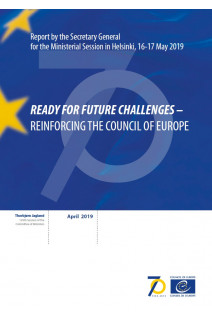A CALL TO MEMBER STATES’ GOVERNMENTS
Council of Europe acquis
New challenges – vital standards
Need to be more proactive
The need to secure financial integrity and a continued focus on efficiency
The Council of Europe’s strategic advantage
CHAPTER I - TRENDS AND CHALLENGES TO OUR DEMOCRATIC SECURITY
Political and legal challenges to our Convention system
Judicial independence under stress in a number of member states
Threats against freedom of expression and media freedom
Freedom of assembly and freedom of association
Social and societal challenges
Negative impact of austerity measures
Need to strengthen anti-discrimination and equality policies
Protecting national minorities’ rights: maintaining peace in Europe
Addressing migration on the basis of our standards
CHAPTER II - COUNCIL OF EUROPE ACQUIS
Ensuring and protecting rights
Key areas
Enabling participation
Sports
Culture
Education and youth
Internet governance
STRENGTHENING THE ACQUIS BY ADDRESSING MAJOR CHALLENGES
Forced labour (“modern slavery”)
Scope and victim profiles
Source of vulnerability
Identification challenges
Difficulties in acknowledging the problem
Difficulties in addressing the problem
Artificial intelligence
Potential risks of AI
Basis for action by the Council of Europe
Ways forward
Increased inequality
A widening gap
Social rights in Europe
Renewed momentum
CHAPTER III - TAKING STOCK OF THE REFORM PROCESS
A strengthened Convention system
Better co-ordination within the Organisation
A sustainable human resources policy
STRATEGIC PROPOSALS FOR MOVING FORWARD
Strengthening intergovernmental co-operation
Strengthening the monitoring by the Council of Europe
Monitoring by statutory bodies
Monitoring by convention-based and institutional mechanisms
New monitoring approach to critical developments
Addressing the challenge of “grey zones”
Enhancing the ability of the CPT to react to emergency situations
Ensuring the sustainability of the Organisation
Creating a special fund – The Helsinki Fund
Increasing the Working Capital Fund
Moving away from the zero nominal growth policy
Adapting the rules and scale applied to contributions
Towards a more sustainable economic model
Adopting a four-year strategic framework
Continuing structural and administrative reforms
Functions and election procedure of the Deputy Secretary General
Administrative reform and the People Strategy




